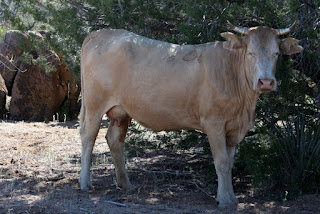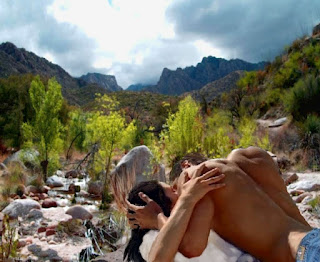Dark Angel never was submitted. I wrote it because the hero came to me in a dream. The story is a bit of a fairy tale which I only recognized after I had completed it and was beginning to edit/edit/edit. It is beauty and the beast. A lot of good romances were first laid out in a fairy tale. After all, there are only so many basic plots out there. It's what you do with it after the basics that separates the books.
Now a real life beauty and the beast (I just watched Hemingway and Gellhorn) wouldn't end happily. Real life tends to get in the way of happy endings, and when you have a man who is a beast, he is likely to be impossible to live with-- especially for an intelligent woman (Hemingway said-- 'Happiness in intelligent people is the rarest thing I know').
Actually their story did have a happy ending, if you ended the story before WWII and the real conflict they eventually faced between the intense career and emotional needs each of them had. Real life often starts where a romance leaves off.
Distracted again-- back to Dark Angel. The beast in this story is not a man who is difficult like Hemingway, but it is where opposites attract. Kind of like that old Billy Joel song Uptown Girl with a downtown guy. Actually he sang another about this combo also earlier where he was the boy your mama warned you about.
Dill is all of that but he's mostly a good man in a bad spot. Seemingly you'd think it'd be a popular story. Maybe too many had read it already with the fairy tales? Perhaps they thought dark angel meant evil, and it doesn't but is the title maybe wrong for it? Well I don't know.
Asking why a book doesn't attract readers is the kind of question writers do ask. With mine, sometimes I know with say a story like Moon Dust where it's dealing with the adult ramifications of childhood abuse. Golden Chains had some fearing erotica and others not that interested in the art community.
Dark Angel though seems more generally of interest, with a tough and interesting hero coming together with a beautiful and strong heroine. There is, however, for it one possibility that seems as likely as a plot that turned readers off. I never did a free day.
When I got onto Kindle, I liked the idea of the free day promotions that are part of Select. I am an unknown quantity as a writer. People don't want to take the risk even when it's only $2.99. I feel those free days allowed me to introduce myself to a lot of readers. They would then know what to expect from a Rain Trueax book. And there are certain dependable elements.
Then I began to hear people in the forums saying they waited for free books. The system has spoiled them for buying at all. That eventually becomes self-defeating for the writer who would like to have the books be profitable.
So Dark Angel never got that freebie boost. No book of mine will from now on even if they disappear into the darkness of Kindle where they never see the light. The goal for me now is to see my books available other places, reviewed in other blogs and find readers apart from Amazon. Since now a lot of readers do know my work, I don't see the benefit of undermining readers who paid for a book by giving it away next week. That just proves upsetting.
Now there might be other reasons why Dark Angel didn't do well besides no free day. I really have never understood why readers choose what they do or why one book will suddenly sell 10 copies while another sits there and to me both are good stories in their own way. Anyway, enjoy the trailer as it gives a flavor of the story-- a beauty and the beast story that eventually, after a lot of travails, will end as a fairy tale should. Shame about Gellhorn and Hemingway.















